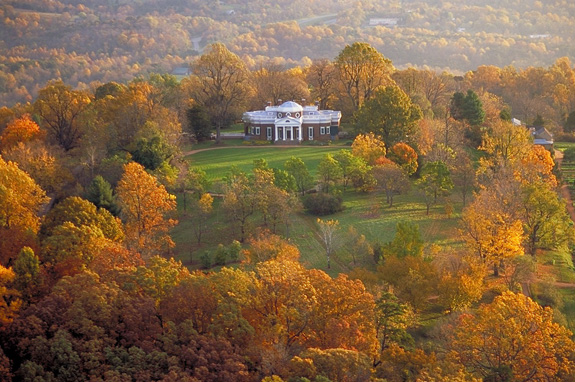Wiencek, Henry. Master of the Mountain: Thomas Jefferson and His Slaves, Farrar, Straus and Giroux, New York, 2012 (336pp.$28).
Having informed the world that all men are created equal and endowed by their creator with certain inalienable rights, Thomas Jefferson proceeded to conduct a forty-year career buying, selling, loaning, whipping and mating with slaves. Jefferson’s holdings included 140 slaves and during his lifetime he owned more than 600, including some children whose skin was nearly white because Jefferson himself had likely fathered them, or had been fathered by local overseers and manor lords. Monticello, Jefferson’s plantation, was like a small town, with the great house on a hill where dozens of slaves, mostly women, worked in an underground kitchen to prepare three elaborate meals a day for upwards of 26 of Jefferson’s family, guests and prominent visitors. All of the meals were made to “French” standards and exquisite wine was the order of the day at the table. Skilled artisans occupied cabins on Mulberry Row alongside hired white workers and a few slaves lived in rooms at the mansion’s south dependency wing, sleeping where they worked. Jefferson hired foremen who often whipped slaves, including children of both sexes. On occasion, Jefferson advertised in newspapers for the return of runaway slaves, who were brought back to him wearing shackles and iron collars.
“Master of the Mountain” is an attempt to come to terms with the founding paradox of America by detailing the economic and social dynamics of slavery at Monticello. Written in beautiful prose by Henry Wiencek, a prominent historian and winter of the National Book Critics Circle Award in 1999, who has also investigated George Washington’s relations with his slaves in “An Imperfect God” (2003). The book is a brilliant, detailed and often painful truth that sets the record straight about Jefferson and his milieu.
The truth is that Jefferson labored with a painful contradiction at the core of his being. He was determined to “earn his 4 percent” (his actualized profit level from buying and selling human beings) while rationalizing his inability to square his public ideals with his private pursuits. Most of Jefferson’s slaves were inherited from a Wayles on his wife’s side, though once he owned slaves his mercenary habits subtended his better nature. While arguing that black Africans could probably never learn the habits of civilization, he allowed skilled African carpenters, masons, roofers, joiners and nail-makers to construct Monticello itself. Blacks raised his tobacco and later his wheat and cotton, tended his grapes, apples, cherries and pears, ran his stables and blacksmith shop, made his clothes and barrels. Many taught themselves to read, despite Jefferson’s persistent argument that no black African could ever do so. Jefferson took Sally Hemmings (a black slave) with him to France and had children with her, some of whom he later sold or traded away.
In France, Jefferson dealt with true Republicans (in the revolutionary sense) like Lafayette, who pressed him on the issue of “equality and fraternity”, arguing that slavery was a catastrophe in the making for a youthful America. Jefferson temporized with a plethora of sophistic arguments until most of the French revolutionaries gave up. Once back home, Jefferson took out an “equity line of credit” with a Dutch bank using slaves as collateral. Clearly, Jefferson moved his moral boundaries at will, arguing during the time of the Declaration that slavery was an “execrable commerce”, but later in the 1790’s meeting slave ships as they came up the James River to offload their human cargos. Sally Hemmings and Jefferson’s own grandson acknowledged that at Monticello Jefferson “had children which resembled Mr. Jefferson so closely that it was plain that they had his blood in their veins.”
In this wonderful, disturbing, and powerful book slaves have real names—human beings like Isaac the blacksmith and Peter Fossett, an intelligent black house slave who managed to make it to Ohio to become a minister and farmer “across the river”, among many, many others. Unlike Washington, who freed his few slaves by will and was always troubled by their bondage, Jefferson held fast as overlord, master and owner, instructing his heirs to sell some (even children away from their parents) to pay the cost of administering the estate. Our third President, as Wiencek writes, “rationalized an abomination to the point where an absolute moral reversal was reached and he made slavery fit into America’s national enterprise.”
Probably no other book has given as clear a view of the economic and social enterprise of the plantation as “Master of the Mountain.”


